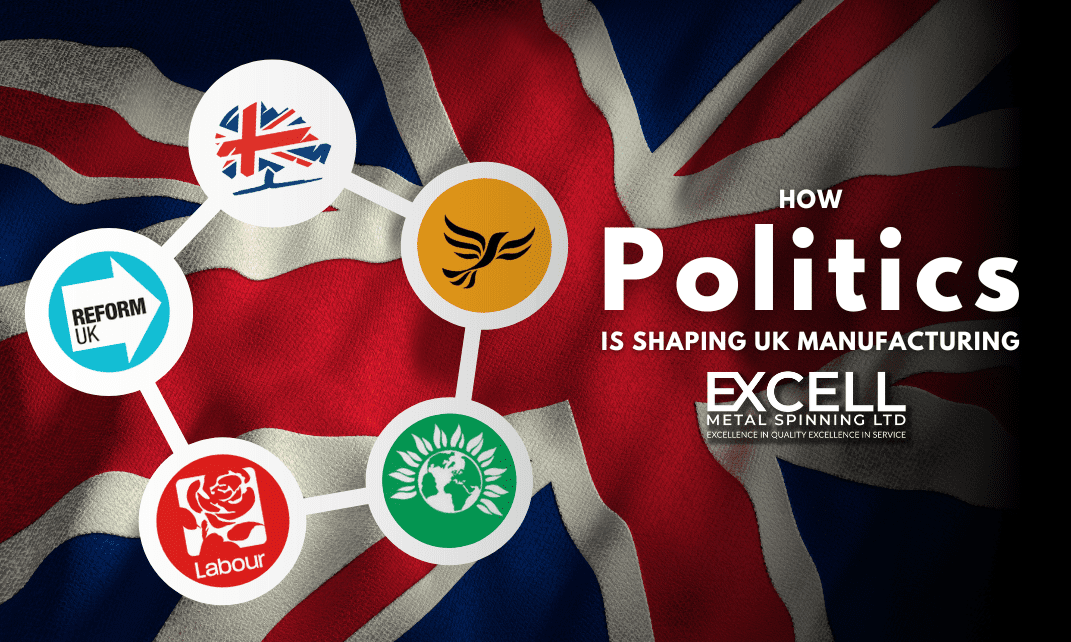How Politics is impacting UK Manufacturing

Chris
Don’t forget to share this article:
Politics is often a sensitive subject dividing many people based on their beliefs and views as to what’s best for the UK. Many avoid the subject altogether, and we can hardly blame them! Bills put forward by Members of Parliament (MPs), with some becoming law, fundamentally change the landscape of the UK, and how businesses within it operate. For UK manufacturing in particular, these laws can have a positive or detrimental impact on our industry.
In the past decade alone, there have been some major political events that have impacted UK manufacturing. 2016’s Brexit referendum and the events of COVID 19 would play a huge role in shaping industry for example. Its hard not to acknowledge the effects some decisions by MPs had on industry, but we will leave the argument of whether they were right or wrong to you.
In this article, we explore some examples of political decisions that have impacted, or continue to impact UK manufacturing. And because of the approaching general election, we will also delve into the manifesto pledges made by some of the UK’s major political parties, that are related to UK manufacturing either directly or indirectly.
A word of caution, as a business we must remain politically neutral. Data will be linked to sources readily available to the public, and opinions will be left to the reader to make.
The Historical impact of government policies on UK Manufacturing
Government policies have played a pivotal role in shaping and directing the UK manufacturing industry. Nationalization, subsidies, privatization and EU membership, to name but a few, have all left their mark on our industry. One has but to wonder the delicate balance policymakers must strike between supporting industries and all the while fostering innovation in a dynamic global economy. Let’s briefly explore some examples of these policies;
Nationalisation
Until the 1970s following the end of the second world war, the UK government followed an interventionist approach, with nationalisation prominent. Industries including coal, steel and railways were all brought under state control with the rationale being multifaceted. The goal being to improve efficiency, stability and strategic control over critical sectors.
There is much debate on the effectiveness of nationalisation. On one hand, some of the goals government had initially set out were achieved. On the other hand, nationalisation resulted in unintended consequences. UK Government was able to provide direct investment, protect jobs and maintain essential services. However, bureaucracy and red tape would often hinder innovation and responsiveness in UK manufacturing. This proved particularly difficult for state-owned companies adapting to changing market dynamics and technological advancements. (source)
Request a Quote
Industrial Subsidies
Throughout the history of UK manufacturing, new bills have been passed by the UK government to subsidise the industry. Often, the aim is to boost investment opportunities and drive innovation. However, there is much to consider when designing and evaluating these industrial subsidies to maximise the benefits and minimise risk.
To begin with, a thorough evaluation is made assessing whether a market failure exists. The subsidies are then designed to address specific market failures or promote strategic sectors thus avoid blanket subsidies. It would then have to be designed to ensure transparency in subsidy allocation and monitor outcomes to minimise wastefulness. (source)
In August 2023 for example, the UK Government announced a £4.5 Billion funding for subsidies aimed specifically at British manufacturing. It targeted sectors that government saw as crucial for economic growth. These included the automotive, aerospace, life sciences and clean energy sectors. The goal here was to accelerate the transition towards greener technologies (source).
Regional Policies
Regional policies continue to be used by the UK government to address disparities and promote economic development within specific regions. It is recognised that these policies are not evenly distributed across the country, but aim to improve regions with relative disadvantage.
One such example is the ‘levelling up’ campaign in recent years, particularly within the northern regions of England. It is aimed towards enhancing skills training and education, and all the while improving transportation networks, digital connectivity and other critical infrastructure i.e. broadband.
The levelling up campaign isn’t without its challenges however, like so many regional policies. In this particular campaign, experts argue that its success depends on how effective its implementation, transparent fund allocation and measurable outcomes are. There are those who criticise whether the campaign will truly address long-standing disparities. And although that is a debate best left to others on this occasion, this campaign serves as a great example of challenges policy makers face on a regional level. [source]
Industrial Strategy
Industrial strategies are coordinated approaches by a government to enhance economic growth, productivity and resilience across various sectors. Governments enact policies and interventions aimed at improving for example, the performance of an industry, fostering innovation and addressing societal challenges. Key areas that are typically focused on is R&D, skills, infrastructure, and the businesses and regional development.
There has been a number of industrial strategies implemented within the UK in recent years. This includes the 2017 industrial strategy, later replaced in 2021 under Boris Johnson’s government “Plan for Growth”. This plan emphasised infrastructure, skills and innovation taking advantage of the post-Brexit opportunities and contributing to net-zero emissions goals. [source]
The manufacturing sector continues to play an important role to the UK economy. Half of the UK’s exports and two thirds of spending on R&D stems from UK manufacturing. Furthermore, the industry employs around 2.6 million highly skilled people across the UK, many of whom work in areas that need levelling up. [source] The importance of an effective industrial strategy in place in order to support UK manufacturing is therefore clear to see.
Manifesto Pledges directly impacting UK Manufacturing
Conservative Manifesto

The conservative party are currently in government and have recently announced their Spring budget, with the Chancellor expressing hopes for one final Budget to win over voters in an Autumn statement. This does hint towards an October election.
Since the last autumn budget, the conservatives have done the following;
- National Insurance was cut from 12% to 8%. These reductions have also applied to the self-employed with the main rate of Class 4 National Insurance contributions cut from 9% to 6%.
- A freeze on fuel duty to support local businesses during the cost of living crisis
- Full Expensing adopted to allow companies to claim a 100% deduction for capital expenditure in the year in which it is incurred.
- R&D Tax credits for SMEs and Large companies merged. This was aimed at simplifying and incentivising R&D expenditure. However, this policy was criticised due to many SMEs now enjoying less generous reliefs for R&D
- Simplifying national insurance contributions for both employees and self-employed taxpayers
- The Freeport and Investment Zone schemes extended. It is said to double the envelope of funding and tax reliefs in each investment zone from £80million to £160million.
- Extensions on existing measures on business rate freezes, especially for SMEs. Small business multiplier in England will be frozen in 2024-25 at 49.9p. Standard multiplier uprated to 54.6p based on September CPI
- Announced that VAT registration threshold will be increased from £85,000 to £90,000. This is aimed to helping SMEs grow
Labour Manifesto

A number of measures are being proposed from the labour party aimed at reform, stability and certainty in the hopes of appealing to businesses. This includes a business taxation roadmap, a cap on corporation tax at 25% and a review to replace business rates with a new system for “business property taxation”. Here’s some of their key policies at a glance that will support businesses in some form;
- Stick to tough fiscal rules with economic stability at their heart
- End VIP ‘fast lane’ procurement processes that allow party political cronies to make money out of contracts from their political friends.
- Reforming planning laws to kickstart millions of homes, transport, clean energy and new industries. Labour aim to reduce bills and provide modern infrastructure considered key for growth and security
- Develop a new industrial strategy created in partnership with businesses. Labour aims to maximise life sciences, digital, creative, financial industries, clean power and the automotive sectors.
- They will create a national wealth fund to unlock billions of pounds of private investment. It will invest in jobs and skills required for ports, gigafactories, hydrogen with labour also committed to protecting the UK steel industry. Upgrades will also be targeted towards the national grid
- Kickstart more high-quality apprenticeships and training opportunities tailored to local jobs in all parts of the country. Labour are committing to setting up technical excellence colleges in all parts of the country to develop specialist skills key to addressing skills shortages for local business, especially in manufacturing.
Liberal Democrat Manifesto

The Liberal Democrats have also outlined several policies that could support business. Let’s take a look at some key points based on the latest information available;
- The Lib Dems aim to bring back the industrial strategy, which they believe is essential for achieving strong and sustainable economic growth. In turn, it will create good jobs, fund vital public services and build strong communities. This is on the backdrop of supply chain pressures to reshore manufacturing
- They aim to rebuild business confidence by committing to fiscal responsibility
- Access to training and skills by scrapping the lower ‘apprentice’s wage’ band and boosting the take-up of apprenticeships
- Incentivising R&D investment, decarbonisation and the take-up of digital technologies, especially among SMEs
- To create a thriving manufacturing sector by investing in the skills of the future, promoting net-zero transport and energy efficiency; harnessing affordable clean energy and adopting an ambitious international trade policy
- Reestablish the industrial strategy council (ISC) and put it on a statutory footing. This is aimed at ensuring oversight, monitoring and evaluation of the industrial strategy for the long-term
Reform Manifesto

The Reform party look to take on the two main parties and we will take a look at some of their manifesto policies they look to implement should they win the general election. More specifically, policies that will shape UK manufacturing;
- The Reform Party plans to free over 1.2 million SMEs from corporation tax by lifting the minimum profit threshold to £100,000. They also plan to reduce the main corporation tax rate from 25% to 20% and then to 15% from year 5.
- The party also has plans to abolish IR35 rules to support Sole Traders. This is because Britain’s self-employed often work longer hours and take more risks, with many who have no pension and don’t receive sick pay.
- They plan to lift the VAT threshold to £120,000 to free small entrepreneurs from red tape
- Reform have pledged their support for SMEs. They will do so by abolishing business rates for high street-based small and medium firms. They also propose an online delivery tax at 4% for large, multinational enterprises to create a fairer playing field for the high street
- An Entrepreneurs tax relief by reducing this down to 5%
- SME Enterprise Zones would be introduced for left-behind areas with a period of zero tax for new or existing businesses that are creating jobs
- A Planning system reform would be introduced to fast track new housing on brownfield sites and infrastructure projects to boost businesses, especially in the North and in coastal regeneration areas
- The party plans to slash Business Red Tape
- Reform also plans to regenerate Britain’s defence manufacturing and technology, and introduce incentives and tax breaks to boost the UK defence industry.
Greens Manifesto

The Green party has outline some policies that will impact UK manufacturing;
- The Green Party plans to reform industrial processes to be more efficient. Renewable heat, Hydrogen and relevant derived synthetic fuels will be prioritised over fossil fuels. This could encourage manufacturing businesses to adopt more sustainable processes
- Incentives for Low Carbon Energy Processes will be used to avoid long-term lock-in of high-carbon technologies.
- They aim to create millions of new jobs in renewable energy, transport, land management, housing and other sectors transformed by the transition to a net zero carbon economy. This could offer opportunities for businesses in these areas
- The Green Party Plans to expand renewable energy to produce 70% of the UK’s electricity, while rapidly phasing out fossil fuels.
Summary of how politics is impacting UK manufacturing
Politics within the UK plays a huge role in shaping industry. Key policies are necessary for driving innovation and creating an environment of competitiveness and growth. However, there is a very fine line policymakers must tread, and poor decision making can have detrimental effects on UK manufacturing, let alone the economy.
And with the general election fast approaching, it is important to take a look into what some of the main political parties pledge in order to support our UK manufacturing industry. The industry Afterall accounts for over 2.6 million jobs. UK manufacturing accounts for 10% of GDP which is estimated to rise to 15% by 2030 which could boost the UK economy by £142 billion. And with the sector now the 8th largest manufacturing sector in the world, it’s important policymakers do everything they can to sustain and grow our great industry!
Related Articles

Tackling Common Misconceptions of Metal Spinning
Metal Spinning is fast becoming the go to process for manufactured goods. But did you know there are many misconceptions of the craft?

Boosting British Manufacturing: A £360 Million Investment
Boosting British Manufacturing: A £360 Million Investment Facebook Twitter LinkedIn WhatsApp Email It’s been declared ahead of the Budget that Chancellor Jeremy Hunt will announce

Design Considerations for Metal Spinning Success: Part One
There are many design considerations businesses should considers to get the most out of their metal spinning supply. Read Part One here

